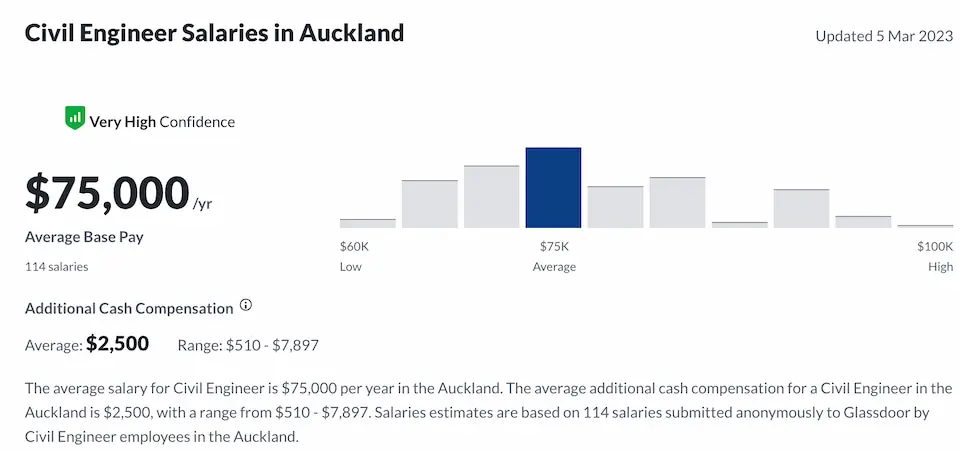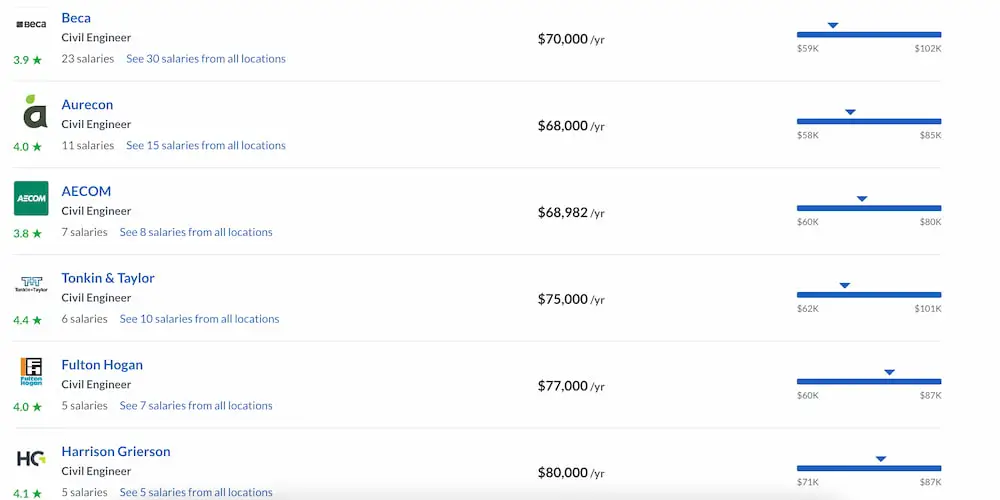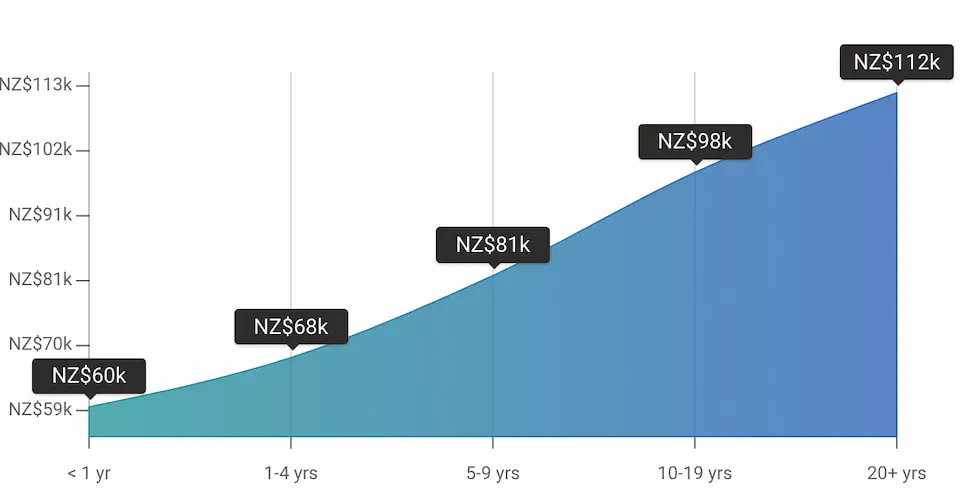Civil Engineer Salary in New Zealand in 2024: Guide

Civil engineers are one of the most crucial professionals in New Zealand. Without them, the country won’t be able to develop. So, qualified civil engineers can expect great reimbursement and other benefits while working in any part of New Zealand.
A civil engineer in New Zealand usually earns between NZ$65,000 and NZ$112,000 per year on average. Employers in Auckland pay the highest salary, with an average of NZ$75,000 per year. Graduate engineers make the least, about NZ$60,000, while civil engineers with few years of experience earn more than NZ$90,000.
Civil engineers are highly sought-after by New Zealand’s employers as the country grows and develops day by day. Some regions are in particular need of construction workers and managers, like Christchurch, for example. As a qualified and experienced civil engineer, you have excellent chances in New Zealand.
How much does a civil engineer earn in New Zealand?
Engineers are some of the best-paid professionals in New Zealand, civil engineers with several years of experience earn an average salary of NZ$90,000 per year, while a starting salary is around NZ$70,000 per year.
For instance, in March 2023, many employers in Auckland offered a salary range from NZ$60,000 to NZ$100,000 per year, with an average of NZ$75,000 per year.
Below you can see a listing of some companies in Auckland hiring civil engineers.


That said, most experienced civil engineers often work as project managers for a salary starting at NZ$100,000 per year.
According to the survey made by Engineeringnz in 2021, a median salary of a civil engineer was about NZ$105,000 per year.
That said, the salary of a civil engineer ranges depending on experience and education, also the role and function play a role.
- The starting annual salary of a graduate civil engineer is NZ$60,000 to NZ$70,000.
- With professional experience, salary increases to about NZ$90,000 and NZ$100,000 annually.
- A leading civil engineer/project manager can expect between NZ$120,000 to NZ$160,000 per year.
In the graph below, you can see how the salary of a civil engineer increases with time, depending on the experience.

Working as a civil engineer in New Zealand
New Zealand needs civil engineers, and they are an integral part of the country’s development. In March 2023, there are over 1,700 open positions for civil engineers across various regions and cities. Many workers are required in Christchurch due to its rebuild after several earthquakes.
When working as a civil engineer in New Zealand, you should be aware of your future tasks as they might differ from what is expected in your country.
In New Zealand, civil engineers plan, design, organize, and supervise the construction and operation of buildings, roads, tunnels, dams, bridges, and other civil engineering projects.
Civil engineers require at least a bachelor’s degree to work in New Zealand. Keep in mind that you might need registration or licensing to perform this job.
Income taxes in New Zealand
In this article, all salaries are mentioned before taxes (gross); hence, before you get a paycheck, some amount will be deducted for taxes.
Income taxes in New Zealand range depending on how much you earn, you can see the exact number on the official website Paye.net.nz. Most employees pay between 15% to 30% in taxes each month.
If you earn a typical starting salary for a civil engineer of NZ$75,000, you pay 22,35% or NZ$16,765 in taxes.
Here are the current tax rates for your first income source (main job):
| Income | Tax rate |
|---|---|
| Up to $14,000 | 10.5% |
| Over $14,000 and up to $48,000 | 17.5% |
| Over $48,000 and up to $70,000 | 30% |
| Over $70,000 and up to $180,000 | 33% |
| Remaining income over $180,000 | 39% |
Visa for a civil engineer
Because civil engineers are on the long-term shortage list in New Zealand, it would be easier for them to get a visa. This profession also falls onto a construction and infrastructure skill shortage list in the following areas:
- Canterbury
- Christchurch City Council, Selwyn District Council, or Waimakariri District Council.
Thanks to the latter fact, civil engineers can apply for an Essential Skills Work Visa if they get a job offer in a specified region.
The duration of the visa depends on your work contract, your skill level, and labor market conditions. Usually, Essential Skills Work Visas are generally issued only for a limited number of years/months.
Alternatively, you can get a regular Skilled Migrant Category Resident Visa or Straight to Residence Visa if you get a job offer from an accredited employer in New Zealand.
Salary of a graduate civil engineer
Entry level salary for a civil engineer who is freshly graduated is NZ$60,000 to NZ$$70,000.
Studying civil engineering in New Zealand is a great choice as you are almost guaranteed a job. For instance, 94% of civil engineering graduates of Canterbury University were employed after graduation.
Principal civil engineer
Principal civil engineers are one of the highest-paying civil engineers in New Zealand. They can expect a salary of between NZ$120,000 to NZ$160,000 annually.
At the moment, there are 43 job listings for a principal civil engineer across the country.
What qualifications and skills do you need as a civil engineer?

1. Education
To work as a civil engineer, you must hold:
- At least Bachelor of Engineering with Honours (NZQF Level 8)
- A Washington Accord-accredited (initial) engineering degree
- A qualification at NZQF Level 7 or higher, with a letter from IPENZ certifying that the degree and any further learning meet the benchmark requirements towards Chartered Professional Engineer professional status in New Zealand
- NZ registration as a Chartered Professional Engineer by the Institution of Professional Engineers New Zealand.
2. Skills
As a civil engineer, you must possess certain skills, and New Zealand’s employers will look for them, particularly good communication skills and the ability to work in a team.
Civil engineers must possess excellent communication skills as they always work in a team and with other stakeholders.
Other essential skills are: understanding industry and government standards, decision-making, critical thinking, analytical thinking, math, organization, technical writing, cultural awareness, and problem-solving.
Some particular knowledge you must bring with is:
- civil engineering and surveying methods
- computer-aided design (CAD) software
- relevant legislation such as the Resource Management Act, the New Zealand Building Code, by-laws, and town planning regulations
- building materials, and how they work.
If you are applying for a role with personal responsibility, you will also need organizational and managerial skills. Besides, civil engineers often manage contractors, architects, construction managers, and other engineers. Hence, leadership skills are necessary.
Moreover, these skills will positively affect your salary:
- Quality Assurance / Quality Control
- Geographic Information Systems (GIS)
- Project Management
- Engineering Design
- Construction Site Inspection
- Autodesk AutoCAD Civil 3D
Places where you might work as a civil engineer in New Zealand
So, if with salary it’s all clear, where can you be employed as a civil engineer in New Zealand?
Firstly, not all professionals make a living as regular employees, many of them work as independent consultants or are employed as contractors, and it’s often project-based.
However, the most common employers in New Zealand are:
- Architectural practices
- Road surfacing firms
- Environmental contracting organizations
- Oil and utility companies
- Telecommunications companies
- Research — in private organizations, government



![25 Best Side Hustles Ideas in New Zealand [2024]](https://simplenewzealand.com/wp-content/uploads/2023/07/wallpaperflare.com_wallpaper-1-1-768x499.jpg)


![Working Remotely in New Zealand for a US Company [2024]](https://simplenewzealand.com/wp-content/uploads/2023/06/pexels-anna-tarazevich-14751273-1-768x512.jpg)
